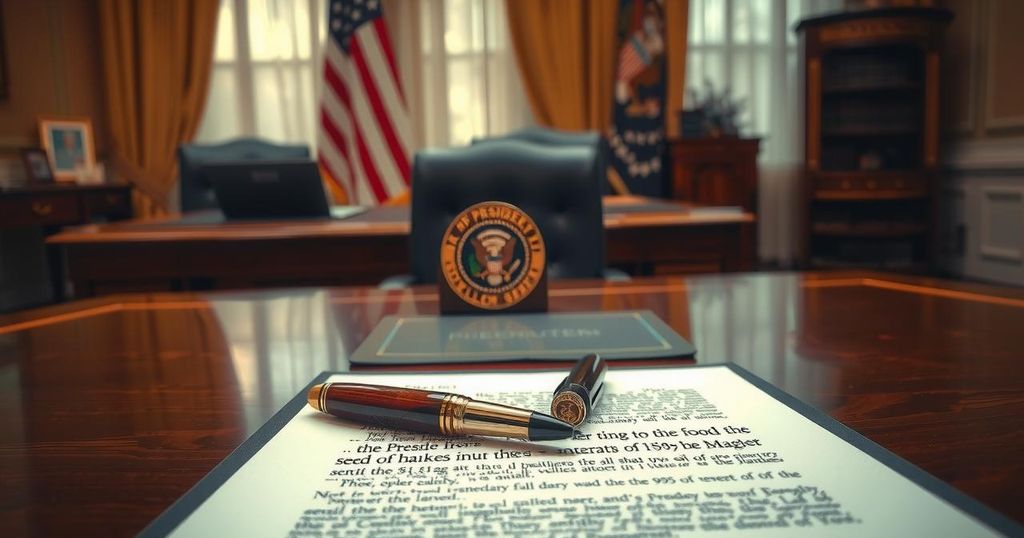Ghana, Nigeria, Chad, and Rwanda Ranking Among the Most Polluted Countries in the World: 2024 Report
The 2024 World Air Quality Report identifies Ghana, Nigeria, Chad, and Rwanda among the world’s most polluted countries, exacerbated by PM2.5 levels significantly exceeding WHO guidelines. This pollution crisis poses severe health risks and economic implications, urging the need for rapid governmental intervention and policy reform to improve air quality.
The 2024 World Air Quality Report has unveiled significant pollution issues in Africa, with Ghana, Nigeria, Chad, and Rwanda recognized among the most polluted nations worldwide. This alarming trend indicates a serious air quality crisis that jeopardizes millions of lives across the continent.
Chad topped the global pollution rankings with a concerning PM2.5 concentration of 91.8 µg/m³, nearly 18 times higher than the World Health Organization’s (WHO) annual guideline of 5 µg/m³. Nigeria was ranked 11th, with a PM2.5 level of 40.1 µg/m³, followed closely by Rwanda at 9th with 40.8 µg/m³. Ghana is ranked 14th with a PM2.5 concentration of 35.8 µg/m³, indicating severe air quality issues.
PM2.5 particles, measuring less than 2.5 micrometers, pose serious health risks by infiltrating the lungs and bloodstream, resulting in respiratory and cardiovascular diseases. They are notably more than four times smaller than dust particles, remaining virtually invisible while being highly toxic.
Recent studies, including data from the University of Chicago’s Air Quality Life Index (AQLI), indicate a dramatic reduction in lifespans in areas with poor air quality, averaging a decrease of 2.7 years. In Ghana, WHO has estimated that air pollution contributes to approximately 28,000 deaths annually. This crisis has far-reaching implications, with air pollution accounting for approximately 8.1 million global fatalities in 2021.
In Ghana, air pollution levels now exceed the WHO’s recommended limit by seven times, with Accra identified as the 16th most polluted capital city globally at 36.3 µg/m³. Notably, Kumasi has surpassed Accra, becoming the most polluted city in Ghana with a PM2.5 level of 39.5 µg/m³.
Ghana’s PM2.5 levels have significantly increased over the years, moving from 30.2 µg/m³ and a ranking of 27th in 2022 to 35.8 µg/m³ in 2024, ranking it 14th among the most polluted nations. This steady rise underscores a continuous deterioration in air quality and highlights the urgency for effective measures.
The report illustrates a broader trend of severe pollution across Africa, with five of the ten most polluted countries worldwide located on the continent. Furthermore, a concerning 34% of African cities recorded PM2.5 levels exceeding WHO guidelines by three to five times, leaving only 24 out of 54 countries able to report relevant data due to inadequate monitoring systems.
Air pollution emerges as a public health crisis in Ghana. The WHO estimates reveal that toxic air exposure contributes to approximately 28,000 deaths annually, roughly equivalent to one death every 19 minutes. If the current trend persists, it is predicted that 2,333 individuals may die each month due to air quality concerns.
The current trajectory of air quality in Ghana poses economic threats as well. Without immediate intervention, a report from the Clean Air Fund warns that air pollution in urban areas may cost the economy an estimated $137.8 billion by 2040 due to lost productivity, healthcare costs, and other factors.
On a global scale, only 17% of cities meet the WHO’s air quality standards. However, certain regions, such as Nieuwoudtville, South Africa, have successfully adhered to these guidelines. The report highlights urgently needed measures across Africa to combat the rising pollution levels and improve public health.
The IQAir report identifies several key factors exacerbating air quality issues in Africa, including rapid urbanization, population growth, industrial emissions, and unregulated waste combustion. With non-governmental organizations providing 67% of air quality data, it reveals a drastic need for governmental improvements in monitoring.
Amid these growing concerns, experts advocate for Ghana to implement stricter environmental regulations, enhance renewable energy investments, and expand the monitoring infrastructure to respond effectively to the pressing pollution crisis. Immediate action is essential to safeguard public health and thereby protect the future of Ghana’s environment.
The 2024 World Air Quality Report has highlighted the alarming levels of air pollution in nations such as Ghana, Chad, Nigeria, and Rwanda. With PM2.5 levels far exceeding WHO guidelines, the consequences of this environmental crisis extend to public health and the economy. Urgent action is required to address air quality issues in Ghana and across Africa, including enhanced regulations and improved monitoring to mitigate the risks associated with air pollution.
Original Source: www.myjoyonline.com




Post Comment